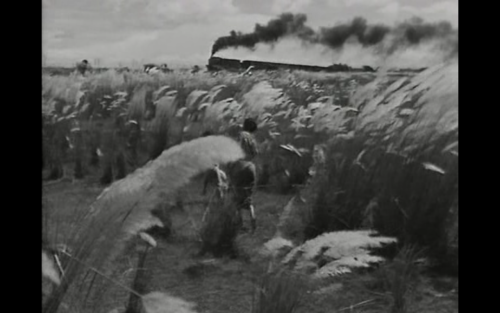
In the vast spectrum of film history, it's difficult to pinpoint precisely where the ceiling stands for the medium's fullest realization of potential. Many a maestro have undertaken ambitious stabs at creating immense behemoths of cinematic pièces de résistance, but so few were able to capture the depth of beauty inherent in the poetic simplicity of Satyajit Ray's Pather Panchali. There's a limited setting, only a few characters, and a storyline too simple to even aptly summarize. But its dreamy realism quickly compels one into insouciance of this matter, as you're drawn into this third world village as if you've lived there all your life.
Ray's camera offers a hypnotizing gaze into the world of these characters going through the simplest tasks of their day. A young boy named Apu and his older sister Durga play together in the fields. Their elderly (to the point of looking skeletal) great aunt Indir shares the home with their mother, Sarbajaya, increasingly aggravated by her old aunt-in-law as she tries to provide for her children while their educated father, Harihar, ventures into the distant cities to to earn money as his family falls deeper into abject poverty. Anyone wishing to pursue film should at once feel shocked, thrilled, and horrified watching this naturalism unfold as if a camera were simply placed unfussily in front of these people — breathing, eating, playing, talking, fighting, loving, dying, and living — and not, as is the actual case, by a first time director working with an inexperienced crew and a group of amateur actors.
But therein lies the true magic of this film which, truly, is the apex of what cinema is capable of achieving. It lies in its transportive properties that lulls you into complete absorption of another world and another time completely removed from your own. It's in the emotional mirror Ray holds up with each shot of his characters that you instinctively just seem to somehow understand thoroughly on a very human level, even when one character is at odds with another. It's in the wonderment one feels going on this journey with the little boy who's lived a life free of any modern technology or privileged convenience as his eyes widen with astonished exhilaration looking up to watch a train pass by for the very first time in his young life, or as he watches a show from a passing theater troupe in awe of the escapism and ambitious dreams for himself it would inspire.
And like with many great works of art, the impact of everything accomplished seems nearly invisible until experienced fully in the sum of its parts. Each passing moment appears inconsequential at first until a devastating final shot alone puts into perspective the entirety of the journey one goes through with the characters of this film. Sitar player Ravi Shankar's relatively minimalist soundtrack somehow manages to help offer the illusion of a full sensory experience, and the cinematic flourishes seem modest if not entirely non-existent. But there is a heart that pulsates rhythmically throughout the entire film, seamlessly, without the slightest bit of fuss to the most profound of consequences that evidences Satyajit Ray's talent as one of the most naturally masterful directors who ever lived. Akira Kurosawa once said of this film that "[i]t is the kind of cinema that flows with the serenity and nobility of a big river...Without the least effort and without any sudden jerks, Ray paints his picture, but its effect on the audience is to stir up deep passions. How does he achieve this? There is nothing irrelevant or haphazard in his cinematographic technique. In that lies the secret of its excellence."

No comments:
Post a Comment